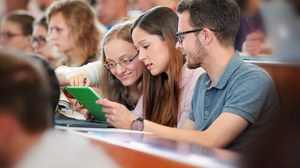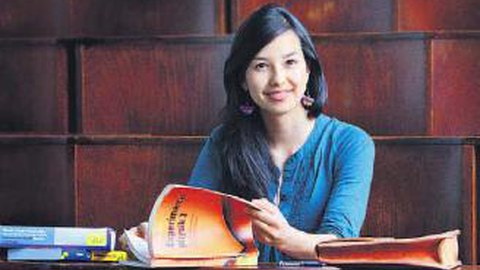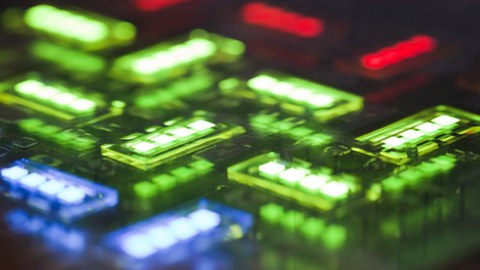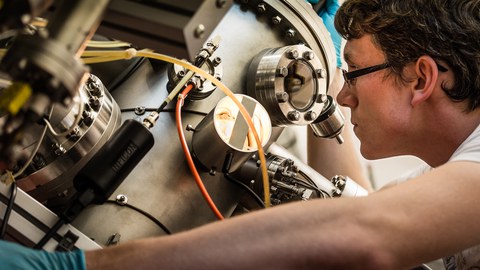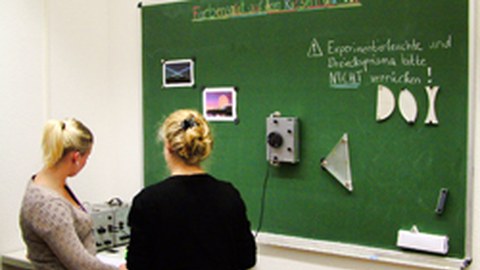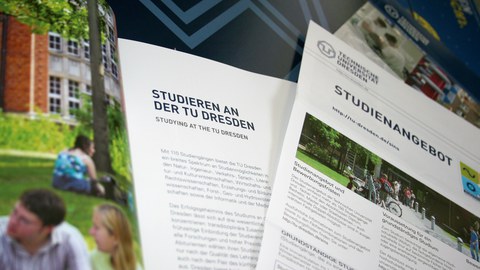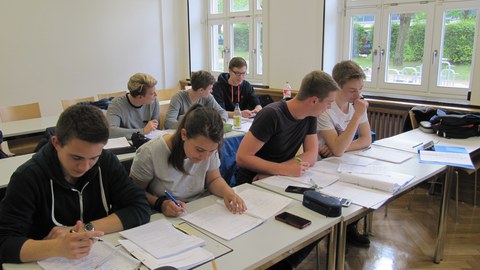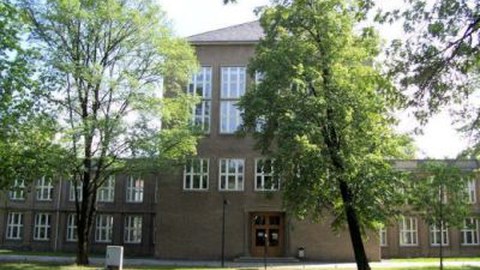Studieren an der Fakultät Physik
Willkommen zum Physikstudium in Dresden!
Die Fakultät Physik bietet vier attraktive grundständige und weiterführende Studiengänge an: den Bachelor Physik, den Master Physics, den Master Organic and Molecular Electronics und das Lehramtsstudium Physik.
 © PantherMedia / ArturVerkhovetskiy
© PantherMedia / ArturVerkhovetskiy
Physik studieren in Dresden
Insgesamt sind ca. 830 Studierende immatrikuliert in den Studiengängen Bachelor und Master Physik, Master Organic and Molecular Electronics sowie Staatsexamen (Lehrämter an Gymnasien, Oberschulen und berufsbildenden Schulen) mit dem Fach Physik. Physik-Studierende können sich je nach Interesse in einer der angebotenen Vertiefungsrichtungen spezialisieren, sei es die Quantenfeldtheorie in der theoretischen Physik, Oberflächenforschung mit modernen Geräten in der Festkörperphysik, aktuelle Themen der Teilchen- und Kernphysik oder die Forschung an organischen Leuchtdioden im Institut für angewandte Physik. Auch ein Nebenjob mit physikalischer Aufgabe ist an der Uni oder in einem der drei Max-Planck-Institute, im Helmholtzzentrum Dresden-Rossendorf und an mehreren Leibniz- und Fraunhoferinstituten immer zu finden.
Genauso wichtig für ein erfolgreiches Physikstudium ist die Ausstattung für die Lehre. Auch hier ist Dresden vorbildlich: überfüllte Hörsäle sind ein Fremdwort, kleine Übungsgruppen sorgen für sehr gute Betreuung. Den Studierenden stehen Übungsräume, Lernräume und Computerarbeitsplätze zur Verfügung. Im Semester finden wissenschaftliche Exkursionen, zum Beispiel zu Bessy II nach Berlin oder zum CERN in Genf statt, die von den Professorinnen und Professoren angeboten oder vom Fachschaftsrat organisiert werden. Ein Mentorensystem mit den Lehrenden der Physik und eine abwechslungsreiche Erstsemestereinführung durch den Fachschaftsrat in Zusammenarbeit mit der Fakultät erleichtern den Start ins Physikstudium und Studentenleben.
Dresden bietet seinen Studierenden sehr gute Studienbedingungen: so stehen uninahe Wohnheime des Studentenwerks zur Verfügung, im Sprachlernzentrum TUDIAS werden 20 verschiedene Sprachen auf allen Niveaustufen angeboten und im Unisportzentrum kann man sogar aus mehr als 130 Sportarten wählen. Der Campus, auf dem sich das Physikgebäude, die Hörsäle und sehr viele Forschungseinrichtungen befinden, liegt im Süden der Stadt und ist mit Bus und Bahn oder dem Fahrrad sehr gut zu erreichen. Die Staats- Landes- und Universitätsbibliothek, kurz SLUB, zählt zu den größten Bibliotheken Deutschlands und bietet ideale Bedingungen zum stillen Lernen. Auch für das leibliche Wohl ist gesorgt: die Mensen des Studentenwerkes bieten preiswerte, abwechslungsreiche Gerichte an. Alle Informationen über das Physikstudium und das Leben in Dresden hat die Fachschaft Physik in ihrem Studienführer zusammengestellt.
Sachsen verlangt von seinen Studierenden keine Studiengebühren, im Semesterbeitrag der TU Dresden ist ein Ticket für den öffentlichen Nahverkehr und ein sachsenweiter Fahrschein für die Deutsche Bahn enthalten. Ausflüge bieten sich damit in die nähere Umgebung von Dresden an: Historisches beim Besuch einer der Burgen oder Schlösser des Schlösserlandes Sachsen, Natur in einem der großen Waldgebiete rund um Dresden und imposante Felsformationen in der Sächsischen Schweiz. Wen es nach einiger Zeit Studium doch noch aus Dresden in die große Welt hinauszieht, der wird durch Austauschprogramme wie ERASMUS unterstützt und kann zum Beispiel aus einer der Partneruniversitäten in Spanien, Schweden, Polen, Kanada, Japan, ... wählen.
- Studienangebot der Fakultät Physik mit Informationen für Studieninteressierte
- Studienstart Physik
- Studieren und Leben in Dresden
Informationen zum laufenden Studium:
- Prüfungsämter der Fakultät Physik sind die zentralen Ansprechpartner für den Bachelor- und Masterstudiengang zu Fragen, die z.B. die An- und Abmeldung von Prüfungen, die Anerkennung von Studien- und Prüfungsleistungen oder die Erstellung von Notenübersichten, Zeugnissen und Bescheiden betreffen.
- Aktuelle Lehrveranstaltungen der Fakultät Physik für Bachelor-, Master- und Lehramts-Studiengänge sowie Physik als Nebenfach: Vorlesungen, Übungen, Tutorien, Seminare und Praktika.
- Lernraum Physik: von Montag bis Donnerstag, jeweils 6. + 7. Doppelstunde, könnt Ihr im Raum REC/D16, unter Anleitung erfahrener Tutoren, gemeinsam lernen, Übungsaufgaben lösen oder generell über „Physik und die Welt“ diskutieren.
- Fachschaftsrat Physik mit Informationen von Studierenden für Studierende

